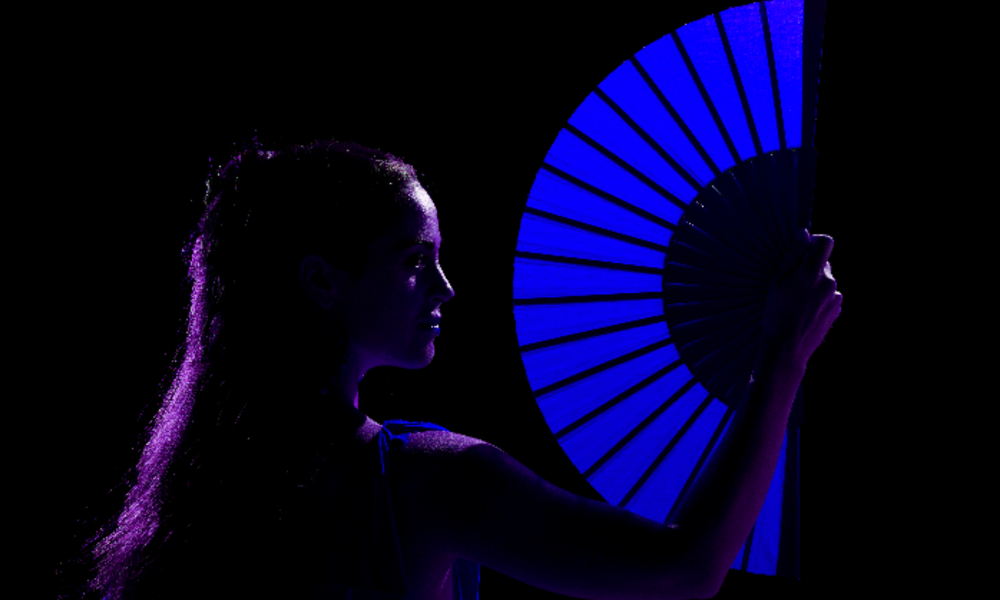Longlisted for the 2020 Voyage YA Short Story Award
.
It wasn’t until my anxious leg-swinging started moving my desk that I finally clicked “send” and closed my laptop.
I chewed my nails and glanced at the vintage photograph sitting next to my phone. It was only half a photo, the edges frayed and weathered. It showed a vibrant young girl, beautiful with thick curly hair cascading around her shoulders, in a flamenco dress, and frozen in the middle of a dance twirl. I’d never seen this girl in my life, at least not before the other day after looking through Abuela’s photo albums for her daily memory lessons. I knew she had left Cuba when she was in her mid-20s, but I had never seen any photos of her before then.
“That photo?” Momi had said when I asked about the girl. “I think I remember seeing it once or twice when I first started dating your dad, but he was very adamant that we didn’t talk about Cuba around his mom. Even when we tried asking for her medical history when his cancer was first diagnosed, she shut down mentally. A doctor suggested PTSD when I forced her into therapy after he passed, so I never brought it up.”
She turned the photo over and read the inscription.
“Velazquez, Camila, Havana, 1951. Such a beautiful girl. She must have been a lot of fun back then,” Momi had said. “Do you have the Vicks? I can’t find the giant tub of it anywhere, just the travel sizes.”
“In the bathroom already. She asked for it a few hours ago,” I said. Vicks VapoRub never lasted long in this family.
“Gracias por todo. T’amo, get ready for bed.” She kissed my head and left to help Abuela with her nightly shower.
I had stared at the old photograph until an idea popped in my head, and I quickly fell into an extensive google search, starting from a general name search in combinations with the year and location. It had taken a few hours, but by a miracle, I narrowed down the Velazquez family Immigration from the same town that Abuela was from to Miami, Florida.
Not much more social media stalking was needed before finding a Twitter account of a girl—a girl who was the absolute spitting image of the dancer in the photo. Victoria Valez, presumably my age, with short black hair that was just as curly as Camila’s, and the same glossy sheen in the same round eyes. The girl on Twitter had a much darker skin tone than the dancer, although it was hard to tell in the black and white photo. A Miami girl with a Twitter feed full of political memes and artistic photos of the beach, of outspoken and bold declarations to argumentative debates that were both comical and inspired. I was smitten, absolutely smitten. On a whim, I had followed her. She had over 400 followers, so I figured a single notification of “Malina Torrez has followed you” wouldn’t catch her attention.
But then I remembered the reason for all the stalking was for Abuela, not to stalk some ridiculously cool girl like I had a schoolgirl crush. I took a picture of the photo, drafted a simple message about finding it in my grandmother’s things, and wanting to reunite them if possible. I linked the picture with the note in a direct message to her, then struggled to hit send for nearly an hour.
Her social life seemed active—all outside activities of course, so I wasn’t expecting a reply for a while. But a notification chime went off within just a few minutes. I threw myself back into the chair and opened my laptop, going straight to Twitter.
Her first reply was “Omg!” followed by a picture of a half-torn vintage photo—the right half of the photo that was on my table. This new one was of Abuela, same age as the girl named Camila, holding her arm towards Camila if you combined the torn halves. Before I could even think of a reply, she sent a phone number and asked me to call her asap on Facetime if possible.
There was something contagious in her excitement, and the bold, confident tone almost made me blush. Without that boost of motivation, I would never have dialed her number and would have missed the first time I actually saw her—a memory I instantly knew would be forever cemented in memory. I called her. She answered.
Half her face was covered in a fashionable honey pot and bumblebee mask, showcasing the most mesmerizing eyes I’d ever seen, a whirlpool of black that sparkled under the Miami sun. She ripped off her face mask and found a spot to sit before greeting me with the widest smile. Sweat gleamed off her forehead, small frizzy hairs escaping a tight hair-bun, and she sat in the middle of a field of grass.
“Okay, tell me everything!”
And I did, after awkwardly introducing myself by name.
Behind my thick glasses that took up half of my own screen and in a thick, itchy sweater, I talked to the most beautiful girl I had ever seen and explained the entire situation from start to finish.
“I can’t believe this! I saw the photo of your grandmother a long time ago, said she was pretty, and my grandma told me all about her. I’m having dinner with my mom and grandma later. Is it cool if I called you after to talk more? Then maybe we can get the old ladies on a video chat?”
“Oh, yeah, I think she’d like that.”
“Tori, we still have an hour on the clock!” someone said just out of view.
“Shit. Sorry, Malina! We’re getting some outside exercise at a golfing field, but gotta get it done before the actual course opens up and they kick us out. Because of course golfing in this economy is such a luxury, right?” She rolled her eyes and slipped her face mask on. “I’ll call you later!”
I laughed, but before I could think of a witty reply, the video chat cut, and I was left staring at my reflection.
I couldn’t decide who had spoken more, it felt like I was the only one doing the talking when explaining everything, but she had been an eager listener. And she was a girl who loved her grandmother. That I could relate to.
I found Momi sitting alone in the reading room, a tray of uneaten black bean soup and bread on the side table, and a tablet practically touching her nose.
“Abuela isn’t hungry again?” I asked, and the slight nod from Momi was all I needed to understand. I grabbed the tray and put the leftovers in the fridge. A spicy, Mexican chocolate protein shake was half empty on the counter, the only meal Abuela had eaten all day.
“I found someone related to that Camila girl that Abuela knew. Her granddaughter.” I showed her the photo Tori had sent of the other half. “That’s Abuela, right?”
Momi lifted her glasses and brought my phone’s screen an inch from her face. Something softened in her expression as she zoomed in on Abuela’s smiling and dancing figure. “Que bonita, I’ve never seen her smile like that. Even her own son used to say his mother never smiled, never laughed, when he was younger.”
“Can I tell her?” I asked, hoping Abuela was having a good day. But Momi shook her head and handed me back my phone.
“I don’t know if that’s a good idea,” she said. “Your dad said she’d completely shut down when he was little and asked about her life in Cuba. And with everything going on now, I just don’t know how she’d react.”
I nodded, slightly disappointed, but also knew without a doubt that I needed to hear what Camila had to say.
“Are you hungry? I can heat up the picadillo from yesterday.” Momi turned off her tablet and stood, heading for the kitchen.
“Only if you are,” I said, anxiety staving off my hunger. She shook her head.
“It was a long day with your grandmother. I need a bath,” she said, grabbing a small bottle of Vicks from the cabinet and walking towards the hallway. “Let me know when you’re ready to watch Walking Dead. And don’t invite any more internet strangers to your Twitter.”
I rolled my eyes as she left for her room, and I moved to mine. Sitting at my desk with my laptop opened, I clicked through a dozen tabs until I found what I was looking for—an incredibly detailed account from someone who illegally fled to America after losing their entire family in Cuba to the revolution. It was within the same year as the photo in Havana. The man, Jose Nerey, had been an officer who enforced, with an entourage of weapons readily available, food and water rations. He had caught a family smuggling an extra pig—only two were approved per household—and not only was he forced to take all three pigs, but he had taken a finger from the youngest child, a ten-year-old girl.
I pulled up another file I had made earlier, a crude photoshop attempt at reuniting the two photos, and wondered if these were the same things Abuela and Camila had been through. I fell into a Wikipedia spiral of everything about 1950s Cuba that was available, which surprisingly enough, was very little. There was almost a secrecy surrounding it, including all the stories that were most likely never to be shared.
And of course, Abuela refused to acknowledge it. The horrors she must have seen.
Tori’s face popped up on my phone, breaking thoughts of trauma. Quickly, I shoved my hair into a bun, cleaned my glasses, and after three deep breaths, answered.
“Hey, Malina! Or is it Lina? I think I saw you pop up as a Facebook friend suggestion after we hung up.” She was sitting on a couch, phone far away enough to see a gray sweater and her curls free and loose around her shoulders. She looked, unsurprisingly and overwhelmingly, pretty.
“Facebook works fast,” I joked, and felt my cheeks blush at the sound of her laugh. “Lina is fine.”
“Let me know if the music is too loud,” she said, head bopping to a low tempo beat. “Dinner was a bust, but I’m visiting my grandma tomorrow. Thankfully, she lives down the street with my grandpa, and I take turns with my brother to deliver their groceries. Just give me a lunch hour with some top-shelf tequila, and I’ll find out the entire story.”
“God, she sounds just like Abuela. I learned very early on that Abuela’s water wasn’t just water,” I said.
“Ay, like Mami’s Mexican water. How the hell did they not all die of alcohol poisoning a long time ago?” Tori’s eyes widened as she covered her mouth. “Oh shit. I’m sorry. That didn’t come out right.”
“No, it’s okay,” I assured her. “It was funny. You’re funny.”
It came out just as cringey as I expected. I moved to my bed, where I sat against the wall, pillow on my lap and phone lifted to my face.
“So, are both of your parents Cuban?” she asked. There was something nice about the question. No one had ever asked that. Mostly everyone assumed I was Mexican, and both my parents were obvious cartel runaways. Growing up in a small midwest town hadn’t been easy for someone so far away from their culture.
We each took our time sharing our racial ancestry, realizing that we had more in common than most other people. I mentioned the articles I’ve read about life in Cuba, and she immediately brightened up.
“My grandma is going to love you,” she said with a wide smile. “She can talk for years about everything she can remember. I can’t wait to tell her about this.”
My bedroom door opened and Momi peeped her head in. “Walking Dead time?” she asked, but before I could say anything, she saw Tori’s face on my phone and paused. Looking at my face, presumably my very red face, she grinned. I groaned. That grin only came out when she thought I was crushing on a girl. “Never mind, let’s watch it for breakfast. I’ll make pastelitos y cafe con leche.”
“Hi, Miss Torrez!” Tori said loudly. “I’m Victoria. Lina’s talked a lot about you.” Momi glanced at me and mouthed, Lina?
I shook my head and shushed her. “Yeah, we can watch it tomorrow. I’m just going to talk to Victoria a little bit longer.”
With just one more side-eye glance, Momi left. I settled back onto my bed, Tori’s smiling face on my phone, and asked about her family.
Our conversation turned into hours of back and forth questions and answers, comparing our lives, discussing movies and TV shows and bands we both loved. She seemed to enjoy filling in the silence, and I enjoyed listening to her until we eventually said goodnight, making plans to talk more the following day after she spoke to her grandparents.
The next morning, after Walking Dead and getting Abuela’s breakfast ready, I opened the bedroom door and quietly whispered, “Abuela, are you awake?”
There was a soft shuffling, and Abuela slowly sat up. Her thin black hair clung to her face, and frail arms reached out to me. “Gracias, Maricela,” she said in a hoarse voice as I placed her tray—a bowl of spiced porridge and cafe con leche—on her lap. She began calling me Maricela, her first daughter’s name, nearly a year before, then asked how my husband and children were.
I glanced at the door, making sure Momi wasn’t anywhere near, and slipped out the photo I hid beneath the plate. “Abuela, quien es?” I asked and pointed to Camila.
Her eyes widened as she looked at the photo, but there was no audible reaction. I opened my mouth to ask again, but she abruptly grabbed the photo and flipped it over. She began shaking her head.
“Como te atreves!” she said sharply, followed by more angry, quiet murmurs. Her language slurred as it usually did when exhaustion hit her. I took the photo away and tried calming her down.
Momi ran in just as Abuela’s breathing turned harsh and nearly shoved me into the hallway. “Malina what the hell did I tell you?” she yelled.
“I’m sorry! I thought it might make her happy, or help her remember literally anything.” Tears pooled on my face. Momi lowered her voice as she saw me, her shoulders sagging in defeat.
“We’ll talk about this later. Vamanos,” she said and turned to Abuela. She closed the door as I wiped my face with a sleeve and returned to my room. It was still a few hours before Tori would call, but I couldn’t get my mind around Abuela’s reaction. She had been so angry at me, as if I spat in her face.
“Are you okay?” Momi asked, leaning in the doorway. “She’s settled in, probably going to rest until late afternoon.”
“Yeah, I’m sorry. I really didn’t think she’d react like that.” I made room on the bed for her, and she sat next to me. She seemed to sag towards the floor. I couldn’t even imagine the exhaustion she felt.
My phone rang, and I answered a video call from Tori. Momi was in the middle of getting up just as two faces popped up: Tori’s and an elderly woman who looked just like Camila’s photo from 1950, only much older.
“Hi, Lina and Miss Torrez! My grandma wanted to meet all of you asap, like as soon as I showed her the picture.” Tori moved the phone, giving Camila the majority of the screen.
Momi sat back down and nearly grabbed the phone out of my hand. They spoke in a clear, precise tone in Spanish, and I nearly shrunk away, fighting shame from not learning Spanish when I was younger. Camila’s voice was surprisingly young-sounding. If I hadn’t been looking at the screen, I would have assumed it was a friend of Tori’s.
Camila’s face was round and on the chubby side with the same dimples as the ones she had in the photo. Her hair was braided and coiled around her head, far different than the style she wore in the 1950s. Her dark skin was nearly wrinkle-free, though there were slight bruises surrounding the lower half of her face.
Momi translated a good portion of their conversation, repeating some of what Tori had said earlier. “Met as teenagers, became best friends, had plans to marry brothers so they could always be together.”
Momi’s voice hesitated for a moment after Camila finished a lengthy sentence. “Camila’s family was approved for the Refugee Program, but Camila said she wouldn’t go without Mercedes. And then Camila was told that Mercedes had been killed.” I leaned forward. Tori hadn’t mentioned that. Her face came into view for just a few seconds as Camila moved around, and by her expression, she hadn’t known either. Camila spoke more.
“She lived the rest of her life thinking her other half was dead,” Momi said, sadness creeping in her voice. She turned to me. “There must have been some miscommunication somewhere in there. Your grandmother didn’t leave Cuba for another fifteen years after Camila, and back then it was almost impossible to find others who fled. That explains why they lost touch.”
“And why everything Cuban is a trigger,” I said. But something still felt off.
“I can see Mercedes, yes? On the video app?” Camila asked in broken English. She looked at me with squinted eyes, lowering her glasses to the bridge of her nose. “Ay, mira que bonita,” she said. “Just like Mercedes.”
I blushed, my entire life I’d been told that I was a carbon copy of Abuela, but I never truly saw it. After seeing her photo in Havana, I finally saw the resemblance.
Momi and I glanced at one another. I hadn’t told Tori about Abuela’s condition, or her reaction. And it wasn’t something that Momi liked discussing.
“When she’s feeling better,” she answered. “Soon. Maybe Sunday.”
Momi had taken the phone while in the middle of asking Camila a question, and before I could complain she was already walking towards the kitchen. I waited a few minutes, listening for familiar words in Spanish, until I realized that she wasn’t returning my phone anytime soon.
I opened my laptop and went to Twitter, smiling as I clicked on a message from Tori that had been sent minutes before.
“Did our phones just get jacked?” she sent.
“You said your grandma could talk for days? My mom is worse. I wouldn’t expect the phones back anytime soon.”
And I was right. It turned out Camila and Momi could actually talk for days. She spent all day Saturday on and off the phone swapping stories, sharing motherhood woes, talking about Abuela’s sharp temper that apparently she’s had her entire life, and occasionally saying hello to Tori’s parents.
And I did the same with Tori, talking on and off through Twitter, messenger, and video chats. Momi and I took turns sitting with Abuela and reading old novels in a quiet voice.
Finally, on Sunday, Momi sat me down at the table.
“You know she’s not getting better,” she said.
I nodded. Abuela had been mentally deteriorating for a while, only now it was becoming physical.
“I spoke to Camila and Tori’s parents about it, and I’ve agreed to have one monitored video chat since they won’t be able to travel here for a while. But I need to tell Mercedes first and make sure she understands. And I need to do it alone so she’ll be less confused.”
“I understand.” And truly, I did. Abuela’s daily life was confusing enough. Adding more names and faces without constant memory lessons would upset her.
Momi’s hand shook, and I squeezed it. This wasn’t easy for her, and though she didn’t say it aloud, I knew she was thinking of Papi, and how it wasn’t fair that he wasn’t here to help his mother.
“I’ll have Camila on the laptop, and you and Tori on a separate phone so Mercedes doesn’t see Tori.” She stood, Camila’s photo in hand, and quietly went to Abuela’s room.
I learned early on to block out these types of conversations. The ones where Momi begs Abuela to understand, to put pants on, to tell her when she needs to go to the bathroom, to stop mashing her food and spitting it behind her pillow.
“I’m so nervous,” Tori sent over a direct message. “And I’m not even there. How are you feeling?”
I smiled. “Excited, I think. Hopeful.”
Shortly after, Momi opened the door and called my name. She brushed tears from her eyes, and I wanted nothing more than to ask her what happened, but that was a personal conversation I would have to respect.
Then I realized she was smiling, and more than that, it was almost the same grin as the one she gave me earlier when I blushed at Tori.
“That was surprising,” she said and nodded towards the laptop. I began setting everything up, calling Camila and having Tori help her set hers up.
“Did she understand?” I asked.
“It was a good day,” she said as I handed her the laptop and followed her into the room. “Those memory games you’ve been playing have been helping.”
“Hola, Abuela,” I said, squeezing her hand.
“Hermosa, mi nina. Malina, mi nina,” she said with a chuckle, and I wiped tears from my face as she repeated my name. Momi was freely crying, knowing how long it had been since Abuela said my name.
“Te quiero mucho,” I said and kissed her cheek. When was the last time she was this clear?
Momi spoke to her in Spanish, giving a gentle reminder of who she was about to see. Abuela nodded, almost harshly, and looked at the laptop. I gripped my phone, and with one last apprehensive glance between the two of us, Momi placed the laptop on the bed desk where Abuela lay beneath. She turned the video chat to full screen, where Camila’s face lit up like fireworks as soon as they saw each other.
Momi tensed up, and my nerves began to fret as Abuela swallowed several times, her chin quivering and gummy lips smacking each other. But then that steely gaze, the defensive eyes she had been famous for, came back. Her mouth opened, and a cracked voice came out.
“Camila.”
The single word was so broken, so full of emotions—hurt, confusion, denial, but more than anything, hope.
And then Camila said Abuela’s name, and it was only a single moment of silence before both women began speaking, quickly and loudly, as if bickering with one another. Abuela came alive as if someone just flipped a switch. Both Momi and I noticed.
When it became apparent that Abuela remembered Camila and understood what was happening, Momi took my arm and led me outside the room.
“Let’s give them some privacy,” she whispered. In the kitchen, she turned to me and broke into a wide grin.
“What?” I asked.
“Well,” she dragged. “It’s not my place to say anything, but you’re my best friend, and I mean, how can I not?”
“Momi, come on.”
She took Camila’s photo out of her pocket and put it on the table. “This was the night Camila confessed her love to Mercedes,” Momi said.
I sat down, my hands covering my mouth.
“I’m sorry, what?”
Momi smiled, sitting across from me. “They’d been in love for a while, but when Camila’s family was approved for the program, she decided to tell Mercedes and begged her to come with them. But your grandmother’s only option would have been fleeing illegally. And she wanted Camila to go to America. It was her only chance of a good life.”
“So she faked her death?” I asked.
Momi nodded. “And when Mercedes finally came to America she didn’t know how to find others who came from Cuba. And she was afraid. Two women, one brown-skinned and one black-skinned, together?”
“Her coping mechanism to losing the love of her life and basically her entire childhood was to shut down at any mention of Cuba,” I said.
Momi rolled her eyes and sighed.
“Okay, armchair therapist, let’s wait until you’re at least done with med school before diagnosing anyone. Go call Tori and let her know how it went.” She gestured at my phone. “But don’t tell her what I told you.”
I nodded, only agreeing because of the respect both women deserved but also knowing how difficult it would be to keep from talking about it.
Tori answered on the second ring, her mouth already frozen in a wide smile as she sat on her couch. “How is she? Is she okay? I tried getting a glance, but my grandma basically kicked me out.”
I shared everything I could with Tori, who was just as invested in the situation as we were.
“Victoria,” Momi said, and Tori straightened up immediately. “Your grandmother said you have a cousin in Cincinnati. When we’re able to travel safely, you and your family are welcome to stay with us. We’re only a few hours away.”
“That would be amazing! Thank you, Miss Torrez!” Tori said.
“Separate rooms, of course,” Momi said towards me. I opened my mouth and raised my eyes at her, only getting a wink in return.
“Of course, we haven’t even gone on a first date yet,” Tori said confidently. I pressed my hands against my cheeks and smiled. Someone called Tori’s name, and she cocked her head a moment. “My mom is trying to discreetly get my attention. I’ll call you later if that’s okay?”
Momi left to check on Abuela, so when I looked back at Tori, I was able to blush and smile freely. “Always,” I said. “Oh, and Tori? Thank you so much for helping with all of this, and for replying to my message. I could have been a total predator or something.”
She grinned, leaning forward. “The cutest girl I’ve ever seen DMs me on Twitter and I’m not supposed to reply? Lina, I would have been insane not to talk to you, so thank you for acting like a creepy predator because it’s the best thing that’s happened to me all year.”
We hung up, and I pressed my head into the cool surface of the dining table as the butterflies and static bolts in my body settled down.
Momi snickered behind me. “I like her, Lina. She’s cute, but promise me that you’ll take it slow and careful?”
She knew I had a tendency of getting my heart broken by pretty girls.
“Promise,” I said. Momi squeezed my shoulder, and I grabbed her hand. “Thank you for being so cool about all of this. We don’t deserve you.”
“I’ll remember you said that the next time you’re screaming at me to leave you alone.” She patted my head and grabbed a bottle of Vicks to take to Abuela. I followed her, silently leaning against the doorway and watching as Abuela lit up at Camila’s face. I didn’t bother trying to hold back the tears. I let them fall because I knew this would be one of the last moments of clarity for Abuela, and having it be a reunion with the love of her life she lost so long ago was like something out of a fairy tale.
As I watched Momi sit beside Abuela and partake in their lively conversations about life in the old Cuba, I realized something and pulled out my phone. I messaged Tori asking if Camila would be willing to sit down and talk to me about her childhood and what she went through, along with everything she could remember about Cuba. Tori quickly responded with a resounding yes.
I held up the photo of Camila and decided that it wasn’t enough to reunite them. I wanted to share their stories, not just as a faint memory but as written testimony. And if I wanted to learn more about Cuba and what my family and so many others fleeing the country went through, then there must be so many others looking for the same stories.
If we can give a piece of Abuela’s childhood back just from a single photograph, maybe we can do the same for others.




